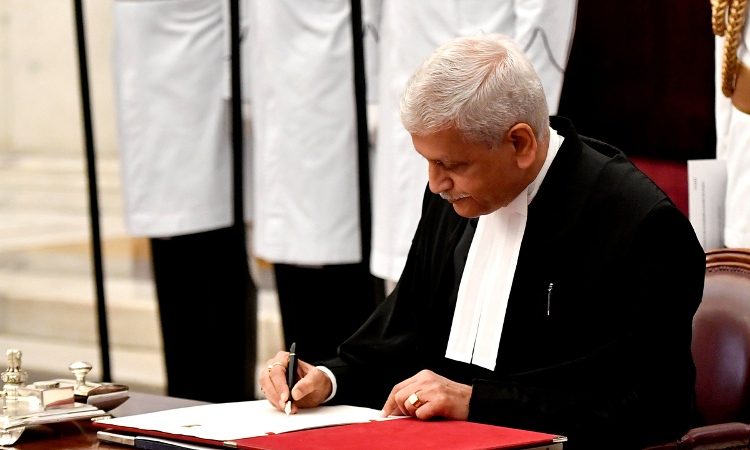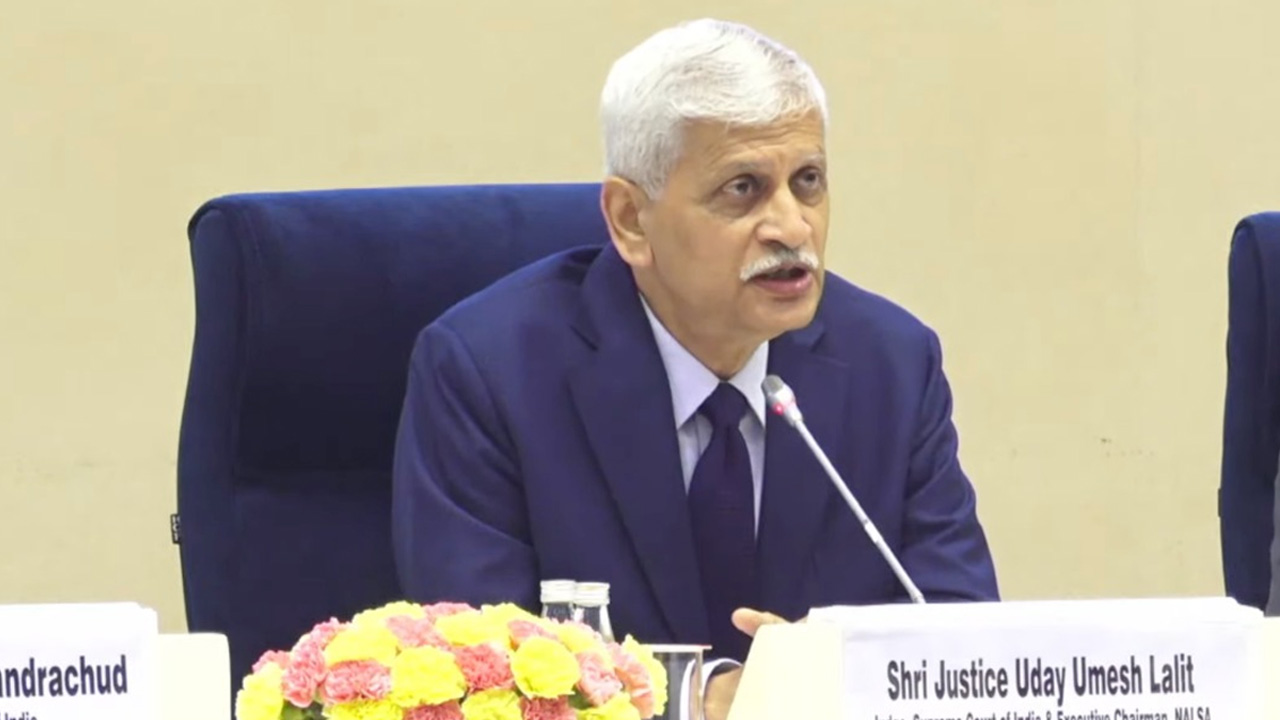Promising Beginning : Expectations From Justice UU Lalit, The New Chief Justice Of India
Manu Sebastian
28 Aug 2022 10:58 AM IST

Justice UU Lalit on being sworn-in as the 49th Chief Justice of India
A day before being sworn-in as the 49th Chief Justice of India, Justice Uday Umesh Lalit made three notable announcements regarding the reforms which he proposed to undertake during his term. They are :
- Will bring more transparency in the listing system.
- Will have a system for freely mentioning urgent matters before respective benches.
- Will strive to have one Constitution Bench functioning throughout the year.
Now, the causelist published for August 29 - the first sitting day of Justice Lalit as the CJI- shows that he is serious about implementing the promises. The list shows an increase in the average number of daily cases listed per bench- around 60- almost double the earlier average. Also, the hijab ban case, which never got posted during the former CJI Ramana's term despite several rounds of requests made by lawyers for urgent hearing, has also got listed on Monday.
It is also to be noted that from August 29 onwards, 25 pending Constitution Bench matters will be listed before concerned benches for completion of pre-hearing steps. Long pending cases related to demonitisation, EWS quota, jellikettu, creation of regional benches for SC,etc., figure in the list(for more, refer here). It seems Justice Lalit is on a mission mode to achieve as much as possible during his brief term of 74 days.
Fulfillment of CJI Lalit's assurances will lead to a radical transformation of the way the Supreme Court functions, resolving a set of long standing issues. There have been voices from the bar calling for improvements in the case listing system. The previous CJI NV Ramana expressed regret for not having been able to pay requisite attention to these issues. The constant functioning of at least one constitution bench, as noted by Justice Lalit in his address, will ensure quick resolution of several substantial questions of law of public importance, which will in turn result in disposal of several other cases pending before High Courts and Tribunals. Since Justice Lalit was a lawyer before his elevation as a Supreme Court judge in 2014 - he is only the second direct appointee from the bar to become a CJI - he might be in a better position to understand the difficulties faced by practising advocates.
Fair and impartial judge who have questioned State excesses
Soon after Justice Lalit's name was announced as the next CJI, there were certain adverse commentaries in media and social media raising doubts about his independence citing his appearance for the present Union Home Minister Amit Shah in the Sohrabuddin case as a lawyer. However, it is totally unfair to raise fingers at him on the basis of this sole ground.
As a judge, Justice Lalit has conducted himself in a fair and impartial manner. Two examples can be given - the hearings in the Sudha Bharadwaj and Varavara Rao cases, where the National Investigation Agency faced tough questions from Justice Lalit. Justice Lalit used his expertise in criminal law to raise various questions of law and facts, and ultimately the NIA got cornered. The bench led by him did not interfere with the statutory bail granted to lawyer-activist Sudha Bharadwaj in Bhima Koregaon case. His bench also cancelled the time-limit set by the Bombay High Court for the regular bail granted to Varavara Rao on medical grounds. During the hearing, the NIA was grilled on various aspects relating to the probe in the Bhima Koregaon case. Recently, Justice Lalit's bench set the time limit for the framing the charges in the Bhima Koregaon case, in which several activists and academicians have been incarcerated.
In the EPF Pension case as well, in which judgment has been reserved, Justice Lalit put the case of Union Government and the EPFO under intense scrutiny and was not prepared to accept some of their claims at face-value without documents backing them.
Justice Lalit speaks in a calm and measured tone and is particular about maintaining the decorum of his court room. Raising one's voice and interruptions are a strict no there. He is courteous to the lawyers and addreses them as "Sir/Ma'am", regardless of their seniority. But one should not get misled by the calm demeanour of the judge, as he is prone to ask strong questions which can catch one off the guard.
On the first day of the hearing in activist Teesta Setalvad's bail plea, Justice Lalit, in what could be termed as a fine example of judicial uprightness, asked Setalvad's lawyer Senior Advocate Kapil Sibal whether there was any objection to him hearing the matter, due to his representation of "few of the accused in the Sohrabuddin murder matter". He proceeded to hear the matter only after Sibal expressed his no-objection. During the hearing in the case, Justice Lalit observed that the Court will test if the incarceration of the accused is necessary. Also, before hearing the Aarey forest mater, Justice Lalit made a disclosure regarding his association with the forest bench cases as an amicus curiae, and proceeded to hear the matter only after the Solicitor General expressed no objection.
It is also to be noted that, before the former CJI NV Ramana took up the issue relating to sedition law, it was Justice Lalit's bench which issued notice first on a plea challenging Section 124A IPC, agreeing to examine the prayer to reconsider Kedaranath judgment. Later, the petition got tagged with other matters before the former CJI NV Ramana.
His bench also quashed the sedition case against journalist Vinod Dua, which was registered in the State of Himachal Pradesh over his critical remarks against Prime Minister and the Union Government in relation to the handling of migrants crisis during lockdown. Justice Lalit's Bench observed - "Every journalist is entitled to the protection under the Kedar Nath Singh judgment(which defined the ambit of offence of sedition under Section 124A IPC)". The judgment upheld the right of every citizen to criticize the measures undertaken by the Government and its functionaries, so long as they do not incite violence and create public disorder.
Recently, Justice Lalit initiated a suo motu case on framing guidelines regarding the potential mitigating circumstances to be considered while imposing death penalty. The attempt is to streamline the process of awarding death penalty by diminishing the element of subjectivity. During the hearing in the case, a shocking policy followed by the State of Madhya Pradesh whereby Prosecutors are given incentives for securing death sentence came to the light. The State's policy came under harsh criticism of his bench and was asked to be withdrawn.
The contempt case against Vijay Mallya also came up due to certain crucial interventions made by Justice Lalit. After the dismissal of the review petition, the contempt case had been lying dormant since 2017. In July 2020, a bench led by Justice Lalit noticed this delay in listing Mallya's contempt case and sought for an explanation from the concerned registry officials for not listing the matter for over 3 years. Last month, his bench sentenced Mallya in the contempt case and asked him to deposit 40 million US dollars, the illegal gains made by flouting court orders. Directions were also given to the Union Government to secure Mallya's presence in India for serving the sentence.
So these instances suggest that Justice Lalit is not someone who hesitates from taking proactive and strong steps.
Challenges
The immediate challenge before CJI Lalit might be the constitution of benches to hear long pending issues such as CAA, Article 370, EWS quota, electoral bonds, money bill etc. The previous CJIs had come under public criticism for not deciding these matters. In this regard, Justice Lalit's promise of striving to keep at least one Constitution Bench functioning throughout is quite reassuring.
CJI Lalit will also have to take a call on the future course of action in Pegasus case and PMLA review.
Another major area of challenge for CJI Lalit will be the filling up of vacancies in Supreme Court, which is at present 4. Two more vacancies will arise during the term of CJI Lalit with the retirements of Justices Indira Banerjee and Hemant Gupta.

Justice Lalit has displayed his administrative skills as the Executive Chairman of the National Legal Services Authority. Under Justice Lalit's leadership, NALSA took several proactive steps resulting in settlement of a record number of cases in Lok Adalats held in different parts of the country in 2021 and 2022. In both the years, the settlement figures crossed the one crore mark, despite the challenges caused by the COVID pandemic. Recently, while launching the Legal Aid Defence Counsel system of NALSA, Justice Lalit spoke about how the majority of the poor are forced to hire services of private lawyers due to the lack of confidence in the free legal aid. Explaining the impact which litigation leaves on the poor, Justice Lalit said : "They must have sold their assets, they must have sold their jewellery, they must have mortgaged their properties, that is what the litigation brings in. Litigation is like a bleeding wound, the more you let it bleed, the man is bound to be suffering from loss of blood, loss of energy. These words indicate that Justice Lalit is not in any "ivory tower" and is conscious of the hard ground realities. Perhaps, his insights are gathered from his years of experience as a criminal lawyer.
The people of this country looks up to the Chief Justice of India UU Lalit with high hopes for positive changes.
(Manu Sebastian is the Managing Editor of LiveLaw. He may be contacted at manu@livelaw.in. He tweets @manuvichar)


